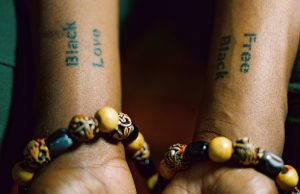Personal is Political: When Women Hit Women
By Cinnamon Williams
 They always touched each other with love. Sometimes, I thought it was too rough…I had to remind myself that even our favorite things get knocked around sometimes. But this was the weekly routine. I was getting scared. It was becoming nightly. The hallway he had just walked down, reeking of sin and gin, lust and luck at the crap tables two nights ago, was dark with anticipation. He gave her a kiss loosely laced with the saliva of other women. Touched her so softly with hard hands, spoke so gently from a hardened heart. I sometimes paid attention to the way she dug her nails into his broad shoulder blades before releasing, trying to hold on for dear life to the very thing that was begging to be let go. The care she took of him was so attractive…but so repulsive. It was beautiful…but I was disgusted by it. Ugly scars from last night’s rage, covered with a tired smile and some drugstore makeup. Sometimes, she skipped the makeup part on account of using the energy for the fake smile. She always knew how to decorate her pain. She gave me my first lessons in love.
They always touched each other with love. Sometimes, I thought it was too rough…I had to remind myself that even our favorite things get knocked around sometimes. But this was the weekly routine. I was getting scared. It was becoming nightly. The hallway he had just walked down, reeking of sin and gin, lust and luck at the crap tables two nights ago, was dark with anticipation. He gave her a kiss loosely laced with the saliva of other women. Touched her so softly with hard hands, spoke so gently from a hardened heart. I sometimes paid attention to the way she dug her nails into his broad shoulder blades before releasing, trying to hold on for dear life to the very thing that was begging to be let go. The care she took of him was so attractive…but so repulsive. It was beautiful…but I was disgusted by it. Ugly scars from last night’s rage, covered with a tired smile and some drugstore makeup. Sometimes, she skipped the makeup part on account of using the energy for the fake smile. She always knew how to decorate her pain. She gave me my first lessons in love.
My mom was apparently lying on the floor, hurt, her body a crumpled mess. I was so little and knew nothing about hurt or babies or mommies carrying babies, but I wanted to be there. To get down on my knees. Touch her belly. Hear her heaving. Feel the rise and fall of my little sister inside. I imagined she would kick, her personal declaration to her parents that she was well aware of what was going on…and sick of their shit. But I wouldn’t have wanted her to come out just yet and see how terrible it really would be. Not just yet. Tia would stand beside me, two years older, but just as puzzled. She always had the answers…except when stuff like this happened. For the first time, we would have had to take care of her, make her feel better. We would have had to fix it.
That’s what we would have done if we had been there in the beginning when my stepdad hit my mom. When they hadn’t even been married for a year and she was pregnant with Kayla. I’m almost sure of it. But we were away for the summer with grandma…missing all of her calls for help. Never mind that we’ve had several chances to take care of her over these last fifteen years.
Once, Tia and I had to work hard to hide it. To hide what was hidden. Her eye had swollen up, lifting from her face. It was a tender, lumpy black, purple, and blue mass smushed from view behind a pair of dark, fancy sunglasses with uneven handles. They slid every time she moved, and whenever she pushed them back up, I could feel her wincing. When she picked us up from the Boys & Girls Club later that afternoon, I dragged her by the hand, breezing through our usual goodbye conversation with the secretary; the puzzlement on her face read as a want to expose. Nothing good could come from embarrassing us all.
I don’t know exactly when I came to the conclusion that male violence against women was wrong, but I was five when I decided that any man causing harm to my mom should have been beaten senseless. And when I had aunts, cousins, and friends go through similar situations with the men they loved, I had similar thoughts. In the years before my explicit feminist awakening, I didn’t have the words to express how wrong it all felt. In the years since, that buzz word, “patriarchy,” just doesn’t seem to do it for me either. I mean…what language do you use to describe your pregnant mother being kicked around like an empty soda can? What are you supposed to say when the police seem to be on the wrong side? After a while, should you even have anything to say? I mean when the kicking becomes routine…should you really feel entitled to say something? Even worse…what do you say if the one doing all the kicking is another woman?
 Only recently (very recently), when a female roommate brutally attacked my older sister physically did I pay close attention to the blatant disregard for physical assaults on women that has been quietly nourished, steadily fed, by willful ignorance and heterosexist ideas about violence against women.
Only recently (very recently), when a female roommate brutally attacked my older sister physically did I pay close attention to the blatant disregard for physical assaults on women that has been quietly nourished, steadily fed, by willful ignorance and heterosexist ideas about violence against women.
After disagreements about housekeeping issues, my sister’s roommate had decided that the best way to tune out Tia’s dissent-to silence the voice that she simply didn’t agree with-would be leaving her with a sprained neck, a swollen eye, a crooked nose, and blood drawn from having her hair snatched out from the root. In passive acceptance of the violence, public safety officials at my sister’s school simply categorized the assault as disorderly conduct. They refused to pursue legal action. The assailant was allowed to continue her normal life as a student at Agnes Scott, going to classes, attending committee meetings. When my sister met with a dean about class accommodations for a course that her attacker was also taking, she was told that nothing could be done to ensure her safety. In fact, she was urged to overcome her mental hurdles as soon as possible and to get acquainted with the idea of seeing and interacting with the student around campus. Tell me those responses don’t sound like all the visible (and invisible) cases of sexual assault running rampant on college campuses. Because this was at a select women’s college that prides itself on tenets like honorable behavior, respectful dialogue, and commitment to the social challenges of its graduates’ times, I found the incident doubly offensive. But I suppose even women’s colleges can reinforce some aspects of rape and assault culture.
I spent the last week of my spring break with Tia, watching her work hard to prove what happened to those who claimed they were there to help. She fought public safety for photos of her injuries. I heard them urge her to not file a restraining order. A dean implied that taking medication was clouding her judgment and festering delusion about her personal safety. During one of our visits to a cold, wood-paneled municipal building, my mother advised her on how to cry to judges and lawyers, almost coaching her on how to be a victim. This seemed fitting to me given constructions of Black women as aggressive and untruthful, but I wondered how long we were going to lobby and campaign for our humanity. I wondered how long we were going to work within a system that was never designed with us in mind.
I’m not entirely sure why the administration there is so tight-lipped (other than those silly fundraising brochures sent to alumni that show women of all races sitting on the green together, laughing, lazily sipping lemonade), but I suspect it has something to do with the subculture of silence we’ve fostered that requires women—especially poor, Black ones—to wade in victimhood and eventually drown in their deserved punishments. At the hands of both sexes. Just like you don’t have to be white to practice white supremacy, you don’t have to be a man to inflict violence against a woman. Additionally, passive participation in such a poisonous kind of verbal and physical domination is enthusiastic complicity.
Patriarchy has told us that when women don’t do as they’re told, they deserve to be put in their place by an all-knowing man. Along those lines, some very narrow brands of feminism have come along and directed our attention solely to instances of domestic violence and physical assault perpetrated by the opposite sex. So, it follows that we think part of dismantling patriarchy entails focusing on how men misuse, mistreat, and abuse women. While equally important, we then forget about the toxic way the physical silencing of women has become almost everyone’s way of life. We forget about women’s violence against each other, LGBTQ women suffering from intimate partner violence, and even the embarrassing numbers of children battered and abused by mothers and other female relatives.
It’s brilliant what that concept of male domination has done. It’s so shameful but has used its attractive power to make us think about violence in the most limited ways, leaving the door wide open for oppressions to reinvent themselves, arrive in new garb, and sit smack dab in our living rooms as invited guests.
___________________________________________________
Cinnamon (yes, that is her real name) is an Atlanta-born writer and sophomore at Williams College where she is majoring in American Studies and minoring in Africana Studies, and was recently named a Mellon Mays Undergraduate Fellow. Her research encompasses Black queer history, Black women’s history, and media analysis in order to examine the evolution of relationships between heterosexual Southern Black women and queer Black men on reality television. Through the project, she hopes to unearth the power of comprehensive popular representations of Black people. Follow her at your own risk on Twitter @ItsNotNutmeg.





Pingback: LGBTQ Assault - Speak About It